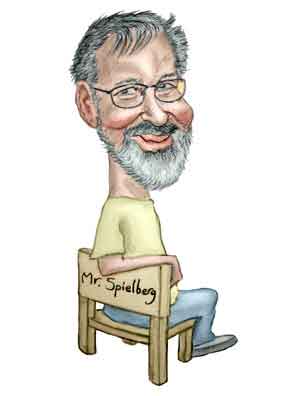Steven Spielberg

Steven Spielberg
Mainstream Popular Culture
This caricature may seem to be going against CooperToons policy. After all it's a caricature of someone that's recognizable and from mainstream popular culture. Worse (for a CooperToons), it's someone everyone knows.
Well, even CooperToons is entitled to an occasional off day, we suppose.
But what really prompted this rendering of Mr. Spielberg was, oddly enough, because CooperToons posted the caricature and brief biography of Bat Masterson. That in turn triggered the memory of the old Bat Masterson TV show.
As those with sufficient age will remember, the actor who played the derby-topped, cane-carrying Dodge City Marshal was Gene Barry. That was a memory that led to another, specifically a memory about another show that also starred Gene. This was the famous Name of the Game.
The Name of the Game was actually a weekly made-for-TV movie. Each episode took a full 90 minutes where the story rotated among the three main stars: Gene, Robert Stack (of Untouchables fame), and Tony Franciosa. And it was a further memory about the Name of the Game that ultimately resulted in the caricature we have here.
How so? Well, in every television series, there will be at least one show that will stick in everyone's mind. Thirty years later, you may have forgotten everything else about the show except that one episode. That's what happened here.
The Name of the Game was, if you remember, about a newspaper and publishing empire. Gene played the part of Glenn Howard, who was far from being a denizen of a money grubbing corporate entity that (at least some say) the publication industry has become today. Although Gene played a multimillionaire mogul publisher, at the same time he was honest, upright, and spent his time and his newspaper's resources crusading for what was best for society and the good of the world. Obviously the show was fiction.
The plots touched on relevant issues of the day, controversial then, perhaps, although now just a slice of Americana. So a show might cover topics like drug use (more common today than ever), racism (still very much with us but usually in disguise), organized crime in poor neighborhoods (no longer the exclusive property of stereotyped ethnic groups), and non-traditional lifestyles (actually always with us, but now just more evident). The acting and the plot carried the show. No gratuitous violence or cheesy looking computer special effects (which nowadays people call realistic), the cast members didn't shout their lines at twice the needed decibels, and the scripts were not hammered out on Wednesday for production on Saturday. The show was so good that today it would have been a flop.
Anyway, in that one memory-jogged episode, Gene - that is, Glenn - was driving along one of the LA thoroughfares listening to the radio. The broadcast was about problems with pollution and its dangers to the environment. Then a fog envelopes Glenn, he gets woozy, passes out, and wakes up 46 years in the future. He's in Los Angeles in the year 2017, and the show was titled, quite logically, LA 2017.
In some ways the show had a more or less typically futuristic anti-Utopian storyline. Pollution has forced everyone to live underground, and corporations have taken over the government (thank God that can't happen). There is a rigid "haves and haves-not" social order with hints of massive forced labor that keeps things going for the privledged. Totalitarian laws were enforced by black-suited and bearded psychiatrists who "treated" people who were too independently minded. If rich people got lonely (or uninhibited from taking their vitamins), they could pick up the phone and have a government supplied "companion" sent to their apartment. All in all not a bad place, provided you were in the right group.
As usual, though, for a science fictional look into the future, the predictions were too telescopic. That is, the script predicted technology advanced faster than it really does (one science fiction film from the 1960's predicted there would be permanent commercial space stations and colonization of the moon by the Millenium) and cultural aspects would be unchanged (you see Bell Telephone logos in the same film). There was, though, one scene in LA 2017 that was surprising prescient, showing that television or motion picture fortune telling isn't always completely off the beam.
In that scene, Gene and his assigned "companion" (played by Sharon Farrell) went to a night spot. The entertainment was a rock and roll band. The band consisted entirely of white haired septuagenarians, playing electric guitars, drums, and keyboards. Naturally the musicians sported long hippie styled coiffures and flower power outfits, their wrinkled aging faces shown close-up as they ecstatically crooned songs about peace and love.
Remember, the show was filmed in 1971. Members of the 60's rock groups were barely turning thirty (Elvis himself was only 36). What? the viewers asked. Old rockers? How ridiculous! How absurd! Ha, ha, everyone laughed, how funny that would be.
By the way, anyone seen the Stones lately?
In any case, while researching the episode, the author of CooperToons learned the director was a 24 year old college dropout - Steven Spielberg.